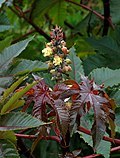Ricinus
Ricinus is a genus of perennial flowering plants in the spurge family, Euphorbiaceae. It is the sole species in the monotypic genus, Ricinus, and subtribe, Ricininae. The evolution of its distinctive seed and the explosive shattering of the seed capsule have been proposed to have occurred in the middle Eocene.
Description[edit]
Ricinus is a fast-growing, suckering perennial shrub which can reach the size of a small tree (around 12 metres or 39 feet), but it is not cold hardy. The glossy leaves are 15–45 centimetres (5.9–17.7 in) long, long-stalked, alternate and palmate with 5–12 deep lobes with coarsely toothed segments. In some varieties they start off dark red, then change to a dark purple or bronze when mature, whereas in others they start off green and remain so.
Taxonomy[edit]
The name Ricinus is a Latin word for tick; the seed is so named because it has markings and a bump at the end that resemble certain ticks. The common name "castor oil" comes from its use as a replacement for castoreum, a perfume base made from the dried perineal glands of the beaver (castor in Latin). It has another common name, palm of Christ, or Palma Christi, that derives from castor oil's reputed healing properties.
Uses[edit]
Ricinus has been used throughout history for medicinal purposes. The plant is the source of castor oil, which has a number of uses. The seeds are also highly toxic if ingested.
Toxicity[edit]
The toxicity of Ricinus seeds comes from the ricin they contain. Ricin is a dangerous poison if inhaled, injected, or ingested, and it is more readily absorbed through the gastrointestinal tract.
See also[edit]
References[edit]
<references />
Ad. Transform your life with W8MD's Budget GLP-1 injections from $75


W8MD offers a medical weight loss program to lose weight in Philadelphia. Our physician-supervised medical weight loss provides:
- Weight loss injections in NYC (generic and brand names):
- Zepbound / Mounjaro, Wegovy / Ozempic, Saxenda
- Most insurances accepted or discounted self-pay rates. We will obtain insurance prior authorizations if needed.
- Generic GLP1 weight loss injections from $75 for the starting dose.
- Also offer prescription weight loss medications including Phentermine, Qsymia, Diethylpropion, Contrave etc.
NYC weight loss doctor appointmentsNYC weight loss doctor appointments
Start your NYC weight loss journey today at our NYC medical weight loss and Philadelphia medical weight loss clinics.
- Call 718-946-5500 to lose weight in NYC or for medical weight loss in Philadelphia 215-676-2334.
- Tags:NYC medical weight loss, Philadelphia lose weight Zepbound NYC, Budget GLP1 weight loss injections, Wegovy Philadelphia, Wegovy NYC, Philadelphia medical weight loss, Brookly weight loss and Wegovy NYC
|
WikiMD's Wellness Encyclopedia |
| Let Food Be Thy Medicine Medicine Thy Food - Hippocrates |
Medical Disclaimer: WikiMD is not a substitute for professional medical advice. The information on WikiMD is provided as an information resource only, may be incorrect, outdated or misleading, and is not to be used or relied on for any diagnostic or treatment purposes. Please consult your health care provider before making any healthcare decisions or for guidance about a specific medical condition. WikiMD expressly disclaims responsibility, and shall have no liability, for any damages, loss, injury, or liability whatsoever suffered as a result of your reliance on the information contained in this site. By visiting this site you agree to the foregoing terms and conditions, which may from time to time be changed or supplemented by WikiMD. If you do not agree to the foregoing terms and conditions, you should not enter or use this site. See full disclaimer.
Credits:Most images are courtesy of Wikimedia commons, and templates, categories Wikipedia, licensed under CC BY SA or similar.
Translate this page: - East Asian
中文,
日本,
한국어,
South Asian
हिन्दी,
தமிழ்,
తెలుగు,
Urdu,
ಕನ್ನಡ,
Southeast Asian
Indonesian,
Vietnamese,
Thai,
မြန်မာဘာသာ,
বাংলা
European
español,
Deutsch,
français,
Greek,
português do Brasil,
polski,
română,
русский,
Nederlands,
norsk,
svenska,
suomi,
Italian
Middle Eastern & African
عربى,
Turkish,
Persian,
Hebrew,
Afrikaans,
isiZulu,
Kiswahili,
Other
Bulgarian,
Hungarian,
Czech,
Swedish,
മലയാളം,
मराठी,
ਪੰਜਾਬੀ,
ગુજરાતી,
Portuguese,
Ukrainian





